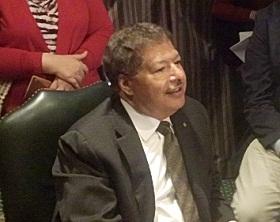Using AI to control energy for indoor agriculture
30 September 2024
Published online 13 June 2011

Nobel laureate Ahmed Zewail's ambition of founding a science research centre in his home country of Egypt may soon be realized, after the ruling Supreme Council of Armed Forces and interim government green-lighted the project last week.
"The Zewail City of Science and Technology will be an incubator for researchers, where they will gain the creative knowledge they need to prepare them to be part of the production process," said Zewail during a press conference in Cairo, Egypt. Zewail has pushed for the project since 2001, but ousted President Mubarak's regime had repeatedly ignored his calls.
The campus will be based on 300 acres in 6th of October City, on the outskirts of Cairo and be home to a university, several research centres and technology parks
Zewail said he has approached several people to form a board of trustees. "I invited 13 distinguished international figures by e-mail and 48 hours later 12 replied accepting."
So far, the board has six Nobel laureates according to Zewail, along with Susan Hockfield, president of the Massachusetts Institute of Technology (MIT) and Gregorio Escario, president of the Cebu Institute of Technology, Philippines. Renowned heart surgeon Magdy Yacoub, Imperial College London and urologist Mohamed Ghonim, University of Mansoura, Egypt, will also serve on the board.
Ahmed Galal, managing director of the Economic Research Forum, a regional research institution covering the Arab countries, Iran and Turkey based in Cairo, Egypt, and a member of the forming board of trustees, said it is still too early to give a detailed plan of the project. "The project will have its independent legal status. The funding will come broadly from Egyptians so that they have as stake in the process, supplemented by other donations from abroad"
Zewail hopes to raise US$1 billion to finance his vision, and an additional US$1 billion for day-to-day funding. His early plans are to enroll 1,000 students in the new university in its first year. This number will grow to 5,000 after five years.
"Egypt needs a project such as this and the idea is very good but it is still vague. We need to know more concrete plans for the project," said Hassan Abol-Enein, head of the Science Age Society, a science-focused non-governmental organization based in Egypt, and director of the Urology & Nephrology Centre, Mansoura, Egypt. "For example, how will the city cooperate with other already established research centres?"
The land for the project had been previously allocated to Nile University, a research university that has suffered several legal hurdles since Mubarak lost power.
Zewail said that his project should absorb the students at Nile University once it is operational.
Mohammed Abd El-Motielb, director of the nanotechnology department at Nile University, welcomed a resolution to the ongoing problems but is worried it may take too long. "Zewail's project will take at least a year to complete, and I believe that Nile University will collapse before that."
"I think that Zewail should help and do something to solve our problem," he added.
doi:10.1038/nmiddleeast.2011.68
Stay connected: